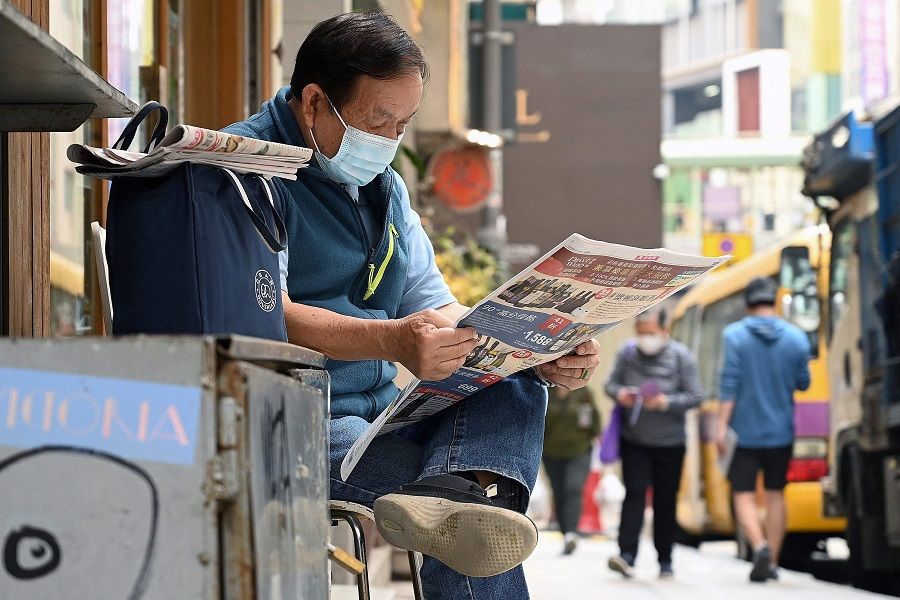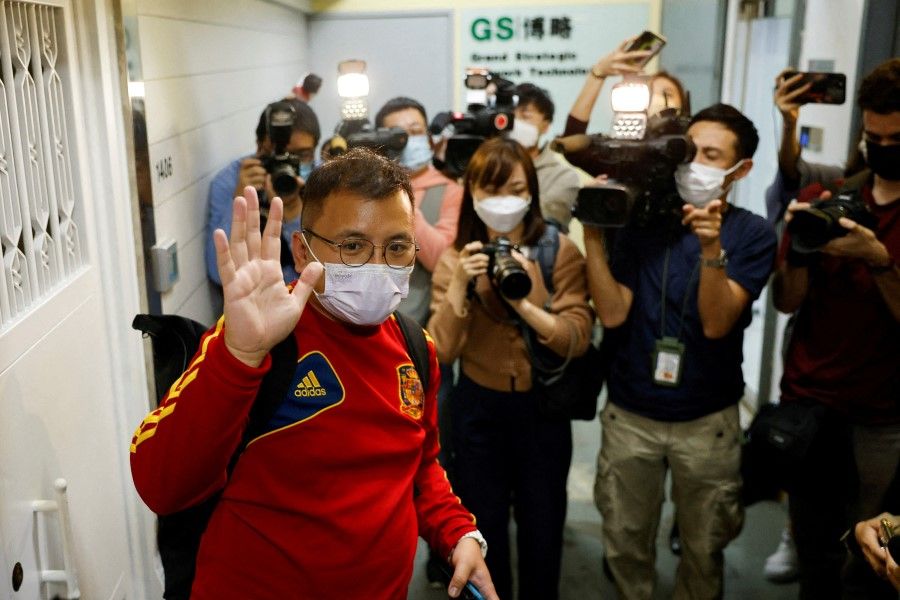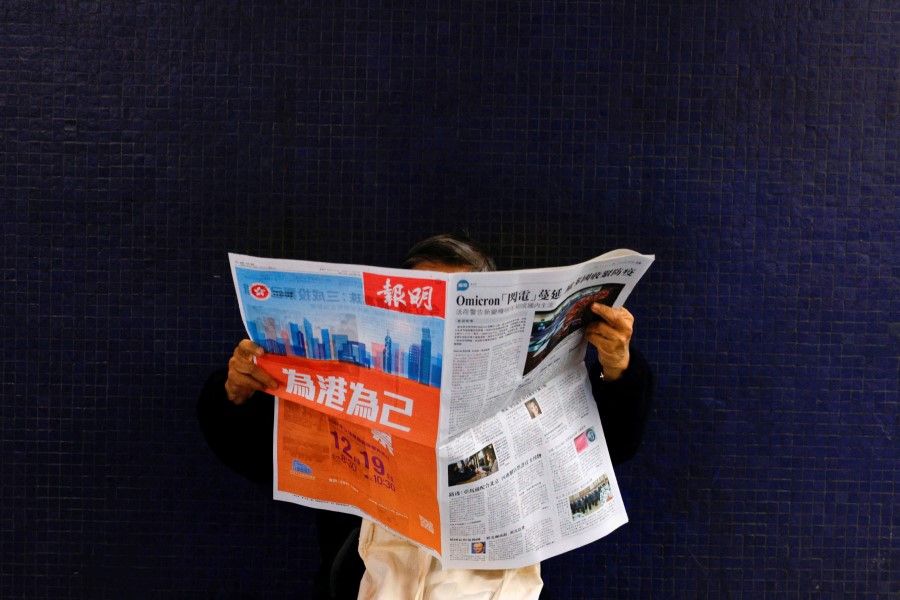As HK pro-democracy media exits the scene, mainland media swoops in

In the year since the Hong Kong national security law was implemented, Hong Kong's media industry has experienced massive changes. Even as pro-democracy media platforms have shuttered and their supporters are setting up public opinion platforms overseas, mainland Chinese media platforms are flocking to Hong Kong and occupying the public opinion battleground.
Hong Kong's information systems are sophisticated and its media industry has always been a leader in Asia. But in the aftermath of the 2019 anti-extradition bill protests, Beijing authorities believed that some Hong Kong media platforms had a hand in instigating the protests and decided to crack down on Hong Kong media.
Last June, the National Security Department of the Hong Kong Police Force arrested several Apple Daily executives on suspicion of "collusion with a foreign country or with external elements to endanger national security", and froze HK$18 million (S$3.11 million) in assets of the newspaper's three affiliated companies. Thereafter, Apple Daily announced its closure.
Recently, two online news websites - namely Stand News and Citizen News - in the same ilk as Apple Daily closed down one after the other. Other smaller pro-democracy media platforms such as Dare Media HK also recently announced that it would suspend its online programmes, street interviews, livestreams, publicity events and other activities in response to "a change in the social atmosphere".

Pro-democracy online news platform Mad Dog Daily, founded by Raymond Wong Yuk-man, also announced its closure early this month. Now based in Taiwan, the former member of Hong Kong's Legislative Council said this about the online news outlet's future, "If given the opportunity, I may resume Mad Dog Daily here [in Taiwan] given enough resources and manpower."
Data shows that Hong Kong was hit by an emigration wave over the past two years, with a large number of pro-democracy supporters migrating to European and American countries and Taiwan. Some people have also established online news websites there, keeping an eye on the situation in Hong Kong.
Personalities such as commentator Stephen Shiu, academic Simon Shen, actor Chapman To, and television host Tsang Chi-ho have remained active online and enjoy high popularity, setting up news programmes on social media platforms, and occasionally commenting on Hong Kong's current affairs and introducing Hong Kong's situation to international society.
Phoenix Media Investment to bolster Cantonese media
Notably, with the greater curtailment of pro-democracy media outlets in Hong Kong, pro-establishment Hong Kong media platforms are strengthening their presence.
Among them, Hong Kong's Phoenix Media Investment, which has always catered to the mainland Chinese audience, recently announced after its six-month reorganisation on 1 January that it would prioritise gaining a foothold in Hong Kong (立足香港) and bolstering Cantonese media. The broadcaster's Phoenix Hong Kong Channel will mainly air Cantonese programmes and a variety of films and variety shows, as well as produce original Cantonese programmes with a better portrayal of local Hong Kong culture.
Besides state media such as CCTV and Xinhua, some local provincial and city level media have also recently set up bureaus in Hong Kong to provide comprehensive reports on Hong Kong news.

Xu Wei, chairman and executive director of Phoenix Satellite TV, said the adjustment has strengthened Phoenix's media positioning of being based in Hong Kong while catering to Hong Kong, Macau, Taiwan, as well as Chinese people around the world. Phoenix will give full play to its influence and transmissive power in Hong Kong, Macau, and Taiwan, to boost cohesion among Chinese around the world, and strive to build a fresh, world-class Chinese-language media group.
Zaobao understands that mainland Chinese media will also ramp up reporting on Hong Kong. Besides state media such as CCTV and Xinhua, some local provincial and city level media have also recently set up bureaus in Hong Kong to provide comprehensive reports on Hong Kong news. Information has it that the authorities feel that the mainland Chinese media "lost its voice" during the anti-extradition movement three years ago, and want to ramp up public opinion efforts in Hong Kong, and strengthen integration between mainland China and Hong Kong.
Hong Kong Journalists Association chairperson Ronson Chan told Zaobao that since the Hong Kong national security law was implemented in June 2020, Apple Daily, Stand News, and Citizen News have successively shut down, leaving Hong Kong with only a few small non-establishment media with insufficient resources, scale, and influence, resulting in a homogenous media industry.
Hong Kong's pro-democratic camp shifting base is equivalent to removing themselves from their target audience, which ultimately would not allow them to make much of an impact. - Li Jiangsheng, Tianda Institute research fellow

Pro-democracy camp will find it hard to make much impact
Chan feels that news reports are all about firsthand interviews, and secondhand information is of little news value. "For example, when local media does court reports, they can add some observations from the location, but reports from outside of Hong Kong can only report the case verdicts."
He believes that if the pro-democracy camp writes about Hong Kong news from overseas, only the commentaries would be of more interest.
Tianda Institute research fellow Li Jiangsheng also told Zaobao that Hong Kong's pro-democratic camp shifting base is equivalent to removing themselves from their target audience, which ultimately would not allow them to make much of an impact.
Right now, Hong Kong's media industry is seeing a chilling effect as they dare not criticise the government, which would lead to many social issues getting hidden and growing into bigger social incidents. In the long run, that would not be good for Hong Kong society. - Ronson Chan, Hong Kong Journalists Association chairperson

Li believes that mainland Chinese media are setting up bureaus in Hong Kong recently because Hong Kong is the meeting point of Asian and Western cultures, and mainland Chinese media wants to disseminate China's voice through Hong Kong and raise China's international speaking rights. He hopes mainland Chinese media can stick to this position in Hong Kong, and excel in generating external publicity with a global perspective.
Li also said that given Hong Kong's current situation, the top priority for the SAR government is to legislate as soon as possible to stop the gaps and clamp down on fake news and rumour-mongering; it has to take effective measures in media control, especially new media, so that the new measures can stop fake news and inflammatory rhetoric.
However, Ronson Chan feels that the role of the media is to monitor the government and society, and many previous social incidents in Hong Kong were first exposed by the media. Right now, Hong Kong's media industry is seeing a chilling effect as they dare not criticise the government, which would lead to many social issues getting hidden and growing into bigger social incidents. In the long run, that would not be good for Hong Kong society.
Related: Interference in China's media industry: Even Global Times editor Hu Xijin 'cannot stand it' | Beijing's 'cleansing' of Hong Kong industries: Who will be the next target? | Stand News closure and the vanishing voice of HK's pan-democrats | Beijing's message behind the closure of Hong Kong's Apple Daily | Governing Hong Kong: Beijing needs to tread carefully with the national security law
